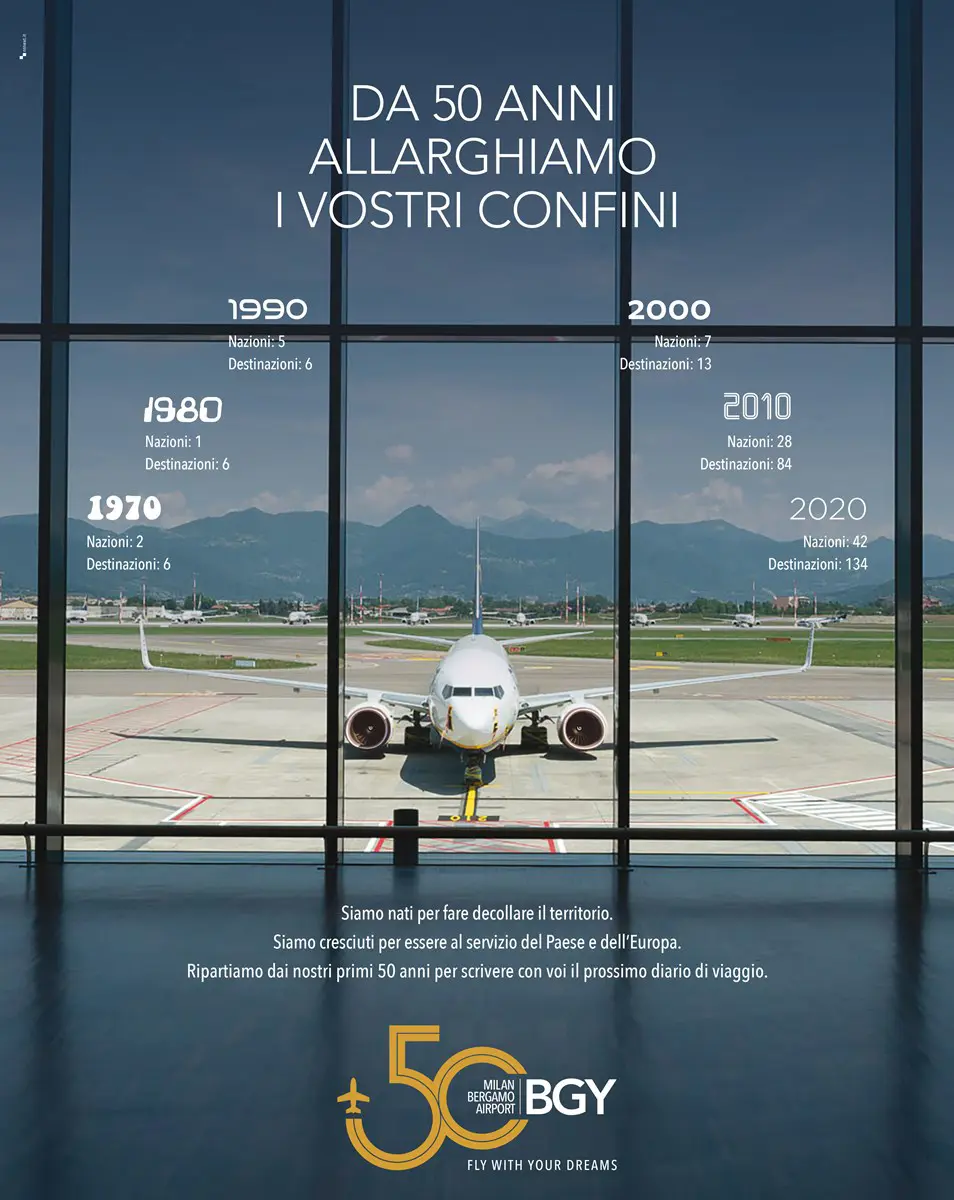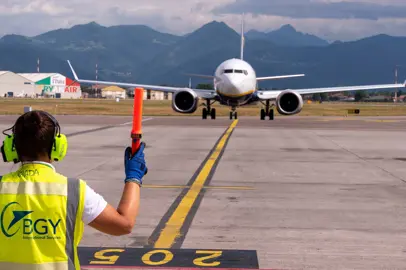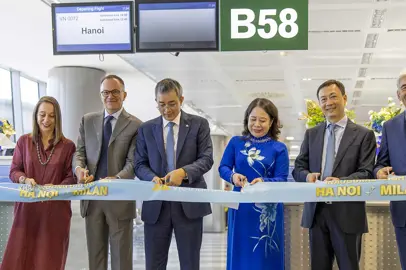16 July 2020
50 years of Milan Bergamo Airport
And the expansion of the third largest Italian airport is continuing
Fifty years ago, on 16 July 1970, the company named Società per l’Aeroporto Civile di Bergamo Orio al Serio - SACBO, was incorporated in the offices of the Chamber of Commerce in Bergamo. This deed was the logical conclusion to a process that had begun two years earlier, when the idea of initiating civil aviation on the existing military airport, dating to 1939, was envisaged.
The major players in those stages of the company’s foundation were Attilio Vicentini, who was then president of the Chamber of Commerce, and who would become the first chairman of SACBO; Giacomo Pezzotta, who was Mayor of Bergamo; Giovanni Giavazzi, president of the Province of Bergamo; Gianni Porfidia, Mayor of Orio al Serio; Bernardi Sestini, president of the Taramelli aero club; and Carlo Pesenti, chairman of Italcementi.
After incorporating the company with an initial share capital of 10 million lire, the SACBO shareholders’ meeting (which included the banks Banca Popolare di Bergamo, Credito Bergamasco and Banca Provinciale Lombarda) voted an increase to 200 million lire in spring 1971. Ten years later, the share capital had grown to 6 billion lire.

Photo: Copyright © Milan Bergamo Airport.
From the operational point of view, on 16 July 1971, exactly one year after SACBO’s incorporation, the Italian Civil Aviation Authority granted its approval for starting flying operations, making it possible to initiate routes to Rome, Cagliari, Alghero and Catania.
The first civil flight was made on 21 March 1972, when an Itavia DC9 set out for Rome Ciampino, taking off from a runway which at that time was 1,800 metres long. By the end of the next decade, it had been progressively extended to 2,800 metres.
On 1 March 1978, the Flights Division of the First Aeronautical Region of the Italian Air Force was disbanded, and the airport took on a definitively civil role, in which the only military presence consisted of the air traffic control detachment, at that time still entrusted to the Air Force.
During the first few years, passenger traffic was limited, but air freight became strategically important, starting from 1976 when DHL decided to install its gateway at Orio al Serio, followed later by UPS. Over the decades, express courier services became a speciality for the airport, which covered a significant proportion of the Italian market and helped make it the third largest Italian airport after Fiumicino and Malpensa.
As regards corporate history, after the death of Attilio Vicentini, in 1976 Giuseppe Brizio took on the role of chairman. He would remain at the helm of SACBO until 1983, when he was succeeded by Giovanni Cavalli, who held the post until 1992.
During Cavalli’s chairmanship, special attention was dedicated to airport infrastructure, which began to take shape in the second half of the 1980s, with an initial series of building projects that gave the airport the possibility of handling increasing numbers of passengers, and an apron that could accommodate a growing operational capacity.
On 26 February 1986, the new airport terminal building was opened, with the control tower built alongside. It is worth remembering that SACBO recorded operating profits from 1988 on, and this made it possible to launch an independently-financed development programme.
The first, important stage in expanding the infrastructure and services continued until 1995. In the meantime, the company SEA acquired part of SACBO’s share capital, initially 20%, which increased to 49.98% some years later. The share was consolidated at the current quota of 30.98% in February 2009.
After Luciano Taddei’s brief leadership of SACBO from 1992 to 1993, the corporate chair was entrusted to Ilario Testa, a manager with a long heritage of experience at Dalmine and Tenaris. Testa’s chairmanship marked the period in which Orio al Serio Airport consolidated its status within the panorama of Italian and European air transport, with the support of the boards of directors serving during his five three-year terms up to 2008, and in complete agreement with the intentions of shareholders and local authorities.
" scrolling="no" src="" width="640">
Video 50 years of Sacbo: Copyright © Milano Bergamo Airport.
In October 1998, a closure of just 48 hours was sufficient for the extension of the runway from 2,850 to 3,022 metres. This operation was implemented as part of a triennial investment programme of 150 billion lire, 90 billion of which contributed by Sacbo itself. The work comprised the airport’s expansion with the installation of two passenger boarding bridges and improvements to aprons and parking bays.
In 1999, for the first time Orio al Serio airport exceeded the number of a million passengers handled in a year. An important step forward in passenger transport was taken on 14 February 2002, St. Valentine’s Day, chosen by Ryanair for the inauguration of its operations at Orio al Serio Airport, with a flight from Frankfurt Hahn on which a marriage was celebrated.
In 2003, the year in which Ryanair opened its operational base, the number of passengers increased from 1.2 million to 2.7 million, initiating a phase of constant growth that took it close to 14 million passengers by the end of 2019.
During Ilario Testa’s chairmanship, in 2002 SACBO obtained a forty-year lease from ENAC, and in 2004 the Airport Development Plan up until 2015 was approved. These were two fundamental steps in the launch of strategies that would accompany the airport’s development.
In the light of Ilario Testa’s success at Orio al Serio Airport, and in recognition of his managerial skills, Bergamo University decided to confer him an honorary degree in management engineering during the opening ceremony of the 2005/2006 academic year. Before the end of his last term, Testa inaugurated the imposing, new, very modern ENAV control tower.
From 2008 to 2011, Mario Ratti, previously president of the Bergamo Industrialists and point of reference for the Bergamo shareholders’ agreement, became chairman of SACBO. This three-year term saw the inauguration of the new departures terminal, with a further increase in capacity and spaces available to passengers implemented between late 2009 and early spring 2010.
The next two three-year terms, from 2011 to 2017, with Miro Radici as chairman, were hallmarked by the important operation of renewing the runway and flight infrastructures, using an innovative technique that limited operational closure to just 20 days in spring 2014. The year after, another important step in the infrastructural improvement plan was taken with the extension of the terminal for Schengen flights and the arrivals area.
In the same period, planning work began for the creation of a rail link, and the foundations of the Airport Development Plan up to 2030 were laid. These objectives were constantly pursued under Roberto Bruni’s chairmanship (2017-2019), with the completion of improvements to the apron on the north side of the terminal, and the launch of sitework for the new area for Non-Schengen flights, which today has been completed notwithstanding the problems linked to the lockdown made necessary by the Covid-19 pandemic.
" scrolling="no" src="" width="640">
Video, Giovanni Sanga President of Sacbo: Copyright © Milano Bergamo Airport.
Expansion of the Airport’s infrastructural facilities is continuing. After the start of Giovanni Sanga’s chairmanship, building work, due to be completed by 2021, has begun on the airport’s extension on its west side, increasing capacity for Schengen flights and preparing a direct link with the future railway terminus.
Edited by Alisè Vitri
Text source: © Sacbo SpA Press Office
Photos, video: Copyright © Sacbo SpA
All rights reserved. Reproduction prohibited.
Copyright © Sisterscom.com
You might be interested in
Airport

Worldwide
Milan Bergamo first European airport in the IATA SeMS program
The airport adheres to the international initiative to strengthen the culture of safety in air transport, aligned with the most advanced international standards in the civil aviation sector
Airport

Worldwide
Fiumicino Airport celebrates 30 years of China Airlines in Italy
The direct flight from Rome to Taipei, operated by the Airbus A350-900, offers convenient onward flights to Australia, South Korea, the Philippines, Japan, Hong Kong, Indonesia, Malaysia, Palau, Singapore, Thailand and Vietnam
Airport

Worldwide
New direct flight Hanoi-Milan at Malpensa
Malpensa is the first Italian airport to offer a direct flight operated by Vietnam Airlines, the Vietnamese flag carrier


